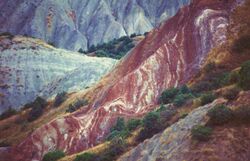Earth:Candy Cane Mountains
The Candy Cane Mountains (Azerbaijani: Şəkər əsası dağları) are shale mountains in the Khizi and Siyazan districts of Azerbaijan, part of the Greater Caucasus mountain range. The 'Candy Cane Mountains' were originally dubbed so by travel author Mark Elliott in his guidebook 'Azerbaijan with Excursions to Georgia'.[1] The mountains' colors are produced by groundwater that alters the oxidation state of the iron compounds in the earth.[2]
The mountains of Candy Cane are composed of shale, a type of sedimentary rock consisting of many thin layers stacked on top of each other. Changes in the environment have led to a difference in mineral composition as sedimentary rock layers are deposited.
When the slate came into contact with water, the layers containing iron oxidized and turned red, while the layer without iron retained shades of white and gray. Over time, tectonic movements and erosion exposed these sedimentary layers, turning them into a visual representation of geological history.[3] The Candy Cane Mountains contain numerous belemnites and fossils from the Cretaceous period, many of which can be spotted on the surface.[4]
See also
- Orography of Azerbaijan
References
- ↑ Elliott book
- ↑ "Sights of Azerbaijan". OSCE. http://www.osce.org/baku/3433. Retrieved 18 December 2012.
- ↑ "Candy Cane Mountains" (in en). http://www.atlasobscura.com/places/candy-cane-mountains.
- ↑ Gila Altmann (Winter 2010). "Tourism in Azerbaijan- Expedition into an Unknown Environment". Impact Azerbaijan. American Chamber of Commerce in Azerbaijan. p. 11. http://www.amchamaz.org/domains/amcham/assets/file/newsletter/impact8.pdf. Retrieved 18 December 2012.
 |


